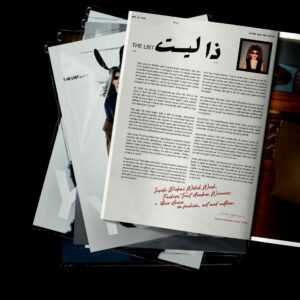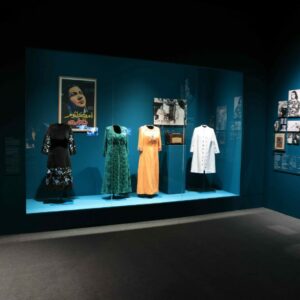9Lebanese DJ and producer Nabih Esta, better known as Nesta, has been a fixture in Beirut’s electronic music scene since he first emerged in 2006. His sets are characterized by a fluid interpretation of genres, splicing together house, techno and disco, often infused with subtle nods to his Middle Eastern heritage.

He honed his craft in London, mastering sound engineering and developing his darker, techno-driven alter ego, Technophile. In 2014, he founded Fantôme de Nuit (FDN), a Beirut-based record label that serves as a platform for his own productions and a launchpad for emerging local and international talent. His tireless dedication has seen him hold residencies at top clubs like Beirut’s Uberhaus and grace the stages of renowned venues like Berlin’s KaterBlau and Sisyphos.
A curator of moods and experiences, on and off the dancefloor, Nesta now lends his discerning ear to our ongoing series “YUNG Selects.” Spanning decades and drawing from a wide range of influences, he offers a meditation on classic Arabic songs, Western touchstones, and contemporary tracks with detours through Egyptian funk, Palestinian oud music, global jazz, disco, trip-hop, and 90s hip-hop, offering a window into the sounds that have shaped Nesta’s own musical vocabulary.
Beginning with Cerrone’s “Music of Life,” the playlist roots itself in disco’s golden age. Cerrone’s work, a hallmark of the late 70s European disco scene, laid the foundation for electronic music’s evolution into house and techno, genres where Nesta himself thrives. The track’s upbeat tempo sets a perfect opening tone, reminding listeners of disco’s lasting impact on modern dance music.
From there, Moloko’s “Fun For Me” injects a dose of 90s trip-hop quirkiness. The song’s playful melody and abstract lyricism feel like a fresh contrast to Cerrone’s disco groove, showcasing how electronic music can be experimental while still accessible. Moloko’s blend of genres mirrors Nesta’s own ethos of mixing the old with the new, and electronic with organic.
Next, the playlist takes a turn with Hany Shenoda’s “Hazeny,” a piece of Egyptian jazz and funk fusion from the 70s. Shenoda’s rich string arrangements and rhythmic complexities speak to Egypt’s vibrant music scene of that era, where Western jazz instruments met Arabic modes.

Then, Joseph Sakr and Ziad Rahbany’s “0007” represents a pinnacle of Lebanese music history. Ziad Rahbany’s progressive blend of jazz and Arabic music has greatly influenced Lebanese culture.
Khruangbin’s “Lady and Man” follows with its smooth, genre-defying blend of global sounds, creating an atmospheric interlude that serves as a modern counterpart to the jazz and funk influences heard earlier. The psychedelic grooves of Khruangbin reflect the band’s love for obscure international sounds, which Nesta similarly appreciates in his own musical curation.
Switching gears, the socially charged “How Many Mics” by the Fugees brings a lyrical edge to the playlist with Lauryn Hill’s politically conscious rhymes on reggae-infused beats. This track’s placement in the playlist adds a rhythmic shift and a touch of 90s nostalgia.
The emotional depth of Le Trio Joubran’s “Sur Cette Terre” follows, offering a meditative pause in the playlist. This piece, rooted in Palestinian oud traditions, honors the legacy of Mahmoud Darwish, and its evocative strings evoke feelings of both longing and strength.
From there, Ibrahim Jaber & Gros Brad’s “Resonance” takes the listener into a fusion of jazz improvisation and electronic textures.
Miles Davis appears next with “Backyard Ritual”, a track that represents Davis’ bold foray into electronic jazz in the 80s. With its futuristic production and dense rhythm, this piece speaks to Davis’ influence on the evolution of not just jazz but also electronic music.

Pino D’Angio’s “Ma Quale Idea” adds a dash of Italo-disco to the mix, with its slinky bassline and irreverent vocals. This 80s dancefloor staple encapsulates the playful side of European disco and hints at the lighter, funkier side of Nesta’s musical repertoire.
Al Massrieen’s “Sah” rounds out the playlist with a blend of Egyptian funk and jazz that helped define the region’s music scene in the late 70s. Known for their sophisticated rhythms and tight grooves, Al Massrieen’s work represents the experimentation happening in Egypt at the time.
Listen to the full list on Spotify here. And tap into the rest of our music coverage over here.












